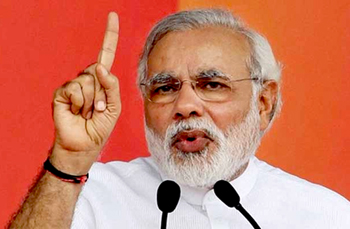Paris, Apr 12: In a scathing attack on previous UPA government, Prime Minister Narendra Modi has said that it had allocated coal blocks like one gives away a pen or a handkerchief, resulting in loss of lakhs of crores of rupees.
 "You must have heard about coal (block allocations)...204 coal blocks were given away just like that...Like someone comes to meet you and you give him your pen, or you give your handkerchief... Even if you give your pen to someone, you will think ten times whether you are giving it to the right person," he said, addressing the Indian community in Paris, during his visit to France as part of his tri-nation tour that includes Germany and Canada.
"You must have heard about coal (block allocations)...204 coal blocks were given away just like that...Like someone comes to meet you and you give him your pen, or you give your handkerchief... Even if you give your pen to someone, you will think ten times whether you are giving it to the right person," he said, addressing the Indian community in Paris, during his visit to France as part of his tri-nation tour that includes Germany and Canada.
"Later, there was a storm and the Supreme Court cancelled all the allocations...Even the name of a (former) Prime Minister was mentioned. I do not want to go into that or criticise...," he said.
Mr Modi said soon after the NDA government came to power, the Supreme Court said no coal can be mined after March 31, 2015.
"We feared that if there is no coal, power plants will be shut down and people will face problems. So we acted fast and decided to auction the blocks," the Prime Minister said.
"20 coal blocks out of 204 have been auctioned so far and we got more than Rs. 2 lakh crore from them," Mr Modi said, while noting that CAG had estimated the loss of Rs. 1.76 lakh crore on account of allocation of 204 mines.
"Only 10 per cent of the work has been done. If any government does such a thing during the entire term, people will say you rule for 25 years," Mr Modi said.
He said that he decided that the revenue generated from the auction will not be kept in the central government's treasury but be given to states for development and healthcare.
The beneficiary states include Bihar, Jharkhand, West Bengal and Odisha, which have coal mines, he said.
"It is not Gujarat...Had Gujarat been one of such states, I would have been accused of doing all this only for Gujarat," he said.
Mr Modi asserted that on the basis of experience of 10 months as Prime Minister, he could say that "there is no reason why India should remain poor."
He said that all the international agencies like World Bank, IMF are saying India is the fastest growing economy.
"Even Moody's is also saying that India's growth prospect are right," Mr Modi said.
Rating agency Moody's last week raised India's credit outlook to 'positive', while Fitch projected faster growth - raising hopes for an upgrade in its sovereign rating in the next 12-18 months.
Mr Modi said the "hopes and expectations" with which BJP has been voted to power will be fulfilled.
Highlighting his 'Make in India' initiative, he said the country was aiming to reach new heights and his government was determined to ensure robust growth.






Comments
Add new comment